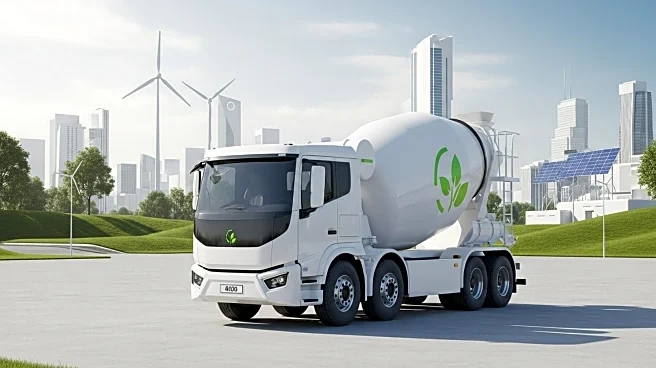What's Happening?
The Sustainable Concrete Buyers Alliance (SCoBA) has been launched by RMI and the Center for Green Market Activation (GMA) with founding members including Amazon, Prologis, and Meta. The alliance aims to accelerate the adoption of low-carbon cement and concrete for modern buildings and infrastructure. SCoBA is the first buyers group formed to collectively procure environmental attribute certificates for low-carbon concrete. The initiative seeks to transform demand into real-world offtake agreements, enabling producers to invest in new infrastructure and pioneering technologies. The cement and concrete sector is responsible for approximately 8% of global carbon emissions and is expected to grow significantly by 2050. However, low-carbon options are currently not available at scale. SCoBA plans to use an innovative book and claim system to allow companies to purchase environmental attributes from sustainable concrete and upstream products like cement and clinker, reducing supply chain emissions and generating revenue to finance decarbonization projects.
Why It's Important?
The launch of SCoBA is significant as it addresses the urgent need to reduce carbon emissions in the cement and concrete sector, which is a major contributor to global emissions. By facilitating the adoption of low-carbon materials, the alliance could play a crucial role in mitigating climate change impacts. The involvement of major companies like Amazon, Prologis, and Meta highlights the growing corporate commitment to sustainability and environmental responsibility. This initiative could lead to substantial investments in green technologies and infrastructure, potentially setting a precedent for other industries to follow. The success of SCoBA could also encourage more companies to join the movement, amplifying its impact on reducing carbon emissions and promoting sustainable practices.
What's Next?
SCoBA's next steps involve implementing the book and claim system to enable the purchase of environmental attributes from sustainable concrete. This approach will help reduce supply chain emissions and generate revenue for decarbonization projects. As the alliance gains traction, it may attract more companies to participate, further increasing demand for low-carbon materials. The success of this initiative could lead to broader industry changes, encouraging more sectors to adopt similar strategies for reducing emissions. Stakeholders, including environmental groups and policymakers, will likely monitor the progress of SCoBA closely, potentially influencing future regulations and standards for sustainable building materials.
Beyond the Headlines
The formation of SCoBA represents a shift towards collective action in addressing environmental challenges. By pooling resources and demand, the alliance can drive significant change in the cement and concrete industry, which has traditionally been slow to adopt sustainable practices. This collaborative approach may inspire similar initiatives in other sectors, fostering a culture of shared responsibility for environmental stewardship. Additionally, the focus on low-carbon materials could lead to innovations in construction techniques and materials science, further advancing the sustainability agenda. The long-term impact of SCoBA could extend beyond emissions reduction, influencing economic models and business strategies centered around sustainability.









